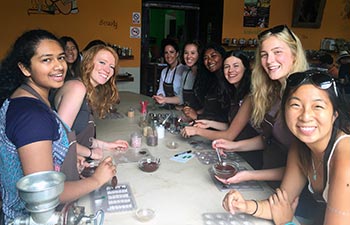
Knowing cultural contexts helps students face modern health-care challenges
Sitting in a Guatemalan clinic, junior Elizabeth Shi listened to a local infectious disease specialist lecture on communicable diseases and parasites in Spanish.
“The doctor’s lectures were very informative, touching on topics such as Chikungunya, malaria, Zika, and Dengue,” Shi said. “It was interesting because in class I’d just read a passage in Spanish about Chikungunya and related diseases such as malaria, and now I was learning about them from the biological angle.”
Shi, who is double majoring in health promotion and disease prevention and gender studies, was participating in USC Dornsife’s Problems Without Passports course “Health, Disease, Language and Culture in Guatemala,” which took 12 undergraduates to the Central American country from May 21 to June 12.
The course was created for students with a pre-health or international development emphasis. It is designed to help future health-care professionals prepare to meet a major and widespread challenge — delivering health care to non-English speaking patients in the United States.
“The best way for health-care professionals to prepare for a cross-cultural setting is to immerse themselves in another culture and acquire language skills before graduate training,” said Erin Quinn, Associate Dean of Admissions Emerita at USC Keck School of Medicine, who led the course.
The intensive, hands-on learning experience the PWP course provides does just that.
Undergraduates plunged into Guatemalan life by staying with local host families, while also taking Spanish classes for up to four hours a day. They attended lectures in Spanish on challenges in Guatemalan and global health, policy, public health, diseases and international development and health. They learned about Guatemala’s health-care system, how education, culture, socioeconomic status, and other factors influence diabetes, as well as about the inequalities between indigenous and Ladino populations.
Gaining understanding firsthand
A visit to a public hospital allowed students to witness firsthand the hardships faced by patients.
“After seeing the conditions, I understood why many women would rather use comadronas [traditional Mayan birth attendants] than go to the hospital,” Shi said. “The experience made me think about privilege, sustainable solutions and health.”
A visit to a rural health-care clinic run by nonprofit Primeros Pasos where students met doctors and volunteers provided a more positive view of health care in the country.

PWP students enjoy a chocolate-making class as they learn about the historical importance of chocolate in Guatemala. Photo courtesy of Elizabeth Shi.
“It was interesting to learn how the clinic had tackled problems in creative ways,” Shi said. “For example, because many people from rural areas may not read Spanish or read at all, clinic staff used a simple picture method to ensure patients knew when to take their medicine.”
Students also gained insights into social conditions in Guatemala. The screening of a documentary about the life of Guatemalan prostitutes was followed with a discussion about the relationship between machismo, prostitution and health.
“Hearing each woman’s story, often heartbreaking ones about childhood abuse, domestic violence and socioeconomic despair, really pulled at my heart,” said Shi. “The conversation led us to talk about women’s health and the power of education.”
A visit to a children’s immigration shelter also proved to be a moving experience for the undergraduates.
“As a daughter of immigrants, seeing and hearing the experiences of these kids made me reflect on the personal side of immigration that often gets ignored in politics and media,” Shi said.
Students learned about the use of plant-based medications in traditional Guatemalan medicine and visited a medicinal herbalist who told students about her experiences treating tortured civil war fighters suffering from physical and psychological trauma.
“Hearing her passion for helping others through her profession made me realize that whatever I do in the future, I want to do it with the same dedication,” Shi said.
A cultural journey
Participants learned about Guatemalan culture, visiting traditional weavers and a music museum that showcased instruments and rituals from Mayan culture.
They also enjoyed getting a literal taste of Guatemala through its cuisine. In addition to experiencing Guatemalan home cooking with their host families, they sampled culinary delicacies at local restaurants and visited a coffee farm and a chocolate museum where they traced the evolution of chocolate through Guatemalan history.
The course culminated with a final symposium during which participants presented their research. Shi found it to be a valuable learning opportunity.
“I got to hear about similar topics from different perspectives, plus different topics as well,” she said. “I learned about maternal and infant health, education and health, mental health and illnesses, drug culture, and everything in between.”
Overall, Shi said she found the PWP to be intensely rewarding,
“During our stay, I saw how culturally rich and beautiful Guatemala is. I learned so much, heard so many moving stories, had so much fun, ate so much good food, and met so many amazing people. But most of all, this PWP has given me tools and knowledge that I know will continue to help me in the future.
“One big lesson I’ve learned is that even if there is good intent to help others, we have to know what is the right way to help them in a respectful manner,” she added. “These three weeks really changed my perspective and my life.”